Border Collies and Golden Retriever Activities
Breed Showing
DOG TRAINING IN HAMPSHIRE AND SURREY
PET TRAINING, FUN AGILITY, CLICKER TRAINING, 1-2-1 LESSONS
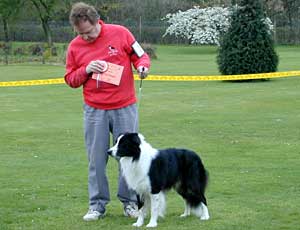
Hercules in First Place
The first recorded dog show was held in 1859 and the nearly 150 years since, Breed Showing has been the most popular canine hobby in the country. Today dog shows are held almost every weekend of the year and are a huge social as well as competative event. All dog shows are licenced by The Kennel Club and held under Kennel rules and control. there are three main types of show.
-
Exeption Shows
- Open Shows
- Championship Shows
To compete in Open or Championship shows a dog must be registered on the Breed Register with The Kennel Club, for a dog to be "Kennel Club Registered" both its parents much have been registered. If your dog is not registered you can still show your dog at Exemption shows which offer both "Breed" and Novelty classes. Whatever the type of show (with the exception of Novelty classes) each dog is judged against the standard for his or her own breed as laid down by The Kennel Club in their Breed Standards.
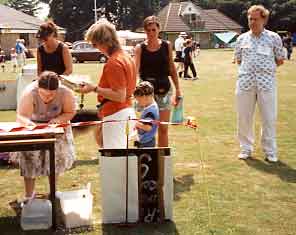
At Exemption Shows entries are made on the day
Exemption Shows are held at local village halls, recreation grounds and other premises throughout the year but mainly in the Summer months. Although Exemption Shows are licensed by The Kennel Club they are, as the name suggests exempt from most of the restrictions and regulations that apply to Open and Championship Shows. Exemption Shows are usually held to raise money for charity, entries are taken on the day at the show venue, no papers or documents are required and dogs do not need to be Kennel Club registered for ether Breed or Novelty Classes
An Exemption Show will usually schedule the four "Breed Classes;
-
Any Variety Puppy - (for puppies of any breed up to one year old).
- Any Variety Sporting - (for gundog breeds, terrier breeds and hound breeds).
- Any Variety Non Sporting (for pastoral breeds, working breeds, toy breeds and utility breeds).
- Any variety Open (for any dog of any breed)
Although dogs do not have to be Kennel Club Registered to be entered in the Breed Classes it is not appropriate to enter cross breeds or mongrels in these classes because by nature of their uniquness there is no specific standard against which individual dog can be judged.
The Novelty Classes will include a variety of fun and imaginative classes such as;
- Pettiest Bitch
- Most handsome Dog
- Best Rescue
- Best Veteran (over a specified age)
- Best 6 Legs (dog and handler)
- Dog with the waggiest tail
- Dog most like its owner
- Best Brace (2 similar dogs)
- Best Irish Brace (2 disimilar dogs)
- and many others
Sometimes Handling Classes and or Obedience Classes are included.
Typcially entry fees are low, there are nice rosettes for those placed in their classes and sometimes local businesses donate prizes. The atmosphere is relaxed and friendly and people will be ready to help with advice, Exeption Shows are an excellent introduction to showing and are enjoyed by people throughout the world of dogs and if you are considering showing your dog this is the place to start.
To find out where local Exemption Shows are being held check the two weekly dog papers, "Our Dogs" and "Dog World", these can be ordered from your local Newsagent.
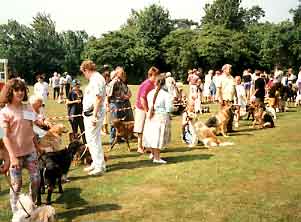
Exemption Show are relaxed and fun
Open Shows are usually run by local district Canine Societies or Breed Clubs and are more formal than Exemption Shows, there are no Novelty Classes and all dogs entered must be pure bred and Kennel Club Registered on the Breed Register. Entries must be made some weeks in advance of the show via a formal entry form which must be completed with your details and those of your dog and returned to the Show Secretary for incorporation in the Show Catalogue. Open shows are usually held at Leisure Centres, Equestrian Centers and Agricultural Show Grounds.
Open Shows may be one of three main types;
-
General Breed Open Shows
- Group Open Shows
-
Breed (specific) Open Shows
At General Breed Open Shows dogs of any breed may be entered, those numerically strong breeds usually have breed specific classes scheduled but if there are no classes just for your breed there will usually be Any Variety Classes into which you can enter your dog, for example if no Border Collie classes are scheduled there will normally be AV Pastoral classes which will include other types of collies and herding breeds, if your breed is scheduled you can still enter an appropriate AV class in addition to your breed class(es). There may also be AVNSC classes scheduled, these are for Any Variety Not Separately Classified and you may only enter these if no specific classes are scheduled for your breed. Usually at Open Shows dogs and bitches are shown in the same classes but dogs and bitches may be shown separately in some or all classes if a very large entry is expected, the classes scheduled for each breed, the name and affix of the judge and sometimes the times of judging will be printed in the Show Schedule which will also contain the entry form. Show Schedules are available from show secretaries, details and advertisements of shows can be found in the two weekly dog papers.
Group Open Shows are restricted to breeds within a specific group such as Pastoral Breeds (collies, shepherd dogs, cattle dogs etc.) or Gundogs (retreivers, pointers, spaniels, etc.) they operate in the same way as General Open Shows.
Breed (specific) Open Shows are usually orgainsed by Regional or National Breed Clubs and are restricted to just one breed, for example The West of England Border Collie Club (regional) or The Golden Retreiver Club (national) . These shows are usually well supported and friendly, additional classes are often scheduled, such as Any Colour but Black and White or Tricolour ( for blue, red, merle or sable dogs), working classes are sometimes scheduled for dogs with working qualitfications and there may be progeny classes for a dogs to be exhibited with their offspring. There are often Junior handling classes and veteran classes. Dogs and bitches are usually shown in separate classes at Breed Open Shows.
A prize card and sometimes a rosette are given for class wins or Best of Breed wins at an Open Show.
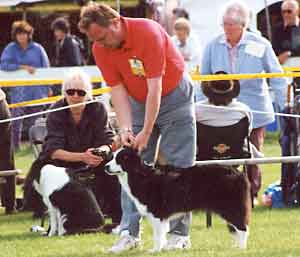
Merry standing for inspection at a Championship Show
Championship Shows are run by Show Societies or Breed Clubs and are in most operational and regulatory aspects the same as Open Shows, however Championship Shows are much larger, schedule many more breeds and have Challenge Certificates on offer to some or all breeds. Championship Shows are usually held at major exhibition centres (such as the NEC), Agricultural Show Grounds or in some cases at the show societies own grounds. The General Championship Shows can last up to four days and may involve between 8,000 - 10, 000 dogs, different groups being scheduled on different days. It is at Championship Shows that awards are accumulated towards the Champion Certificate that is so highly valued amoung the show fraternity.
Championship Shows, like open shows, may be one of three main types;
-
General Championship Shows
- Group Championship Shows
-
Breed Championship Shows
These operate in the same way as the Open Shows described above.
At Championsip Shows extra competitions are often scheduled such as Stakes Classes. Stakes Classes are usually sponsored or Memorial classes held outside the auspice of the breed judging, here all breeds scheduled on that day can compete, they are usually restricted by age or qualification, for example Puppy Stakes, Junior Stakes, Veteran Stakes, Novice Stakes, Champion Stakes etc. Most Championship shows are a grand affair with many stalls selling doggy goods and supplies, catering and benches with a compartment allocated to each entered dog where the dogs can rest and owners stow their show kit.
Breed Championship Shows are the flagship of the breed club or society holding them and whilst much smaller than General Championship shows they are usually very well supported and, like their open show counterparts, schedule additonal special classes, there may also be Junior Handling Classes and sometimes a parade of Champions where Champions in the breed are exhibited not for competition.
Dogs and bitches are usually shown in separate classes at Championship Shows whether General or Breed Specific.
At a Championship show dogs placed 1st, 2nd or 3rd in a qualifying class, qualify to attend the following year's Crufts Dog Show. The qualifying classes for Border Collies and Golden Retrievers are shown below.
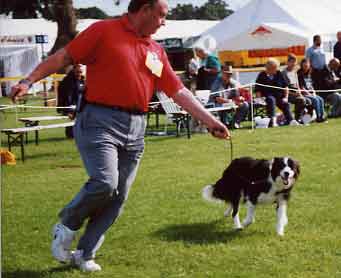
Border Collies should shown on a loose lead
At both Open and Championship shows the main classes are the same and you will have to decide in which class(es) you want to enter your dog at the time of filling in your entry form.
The list of possible classes is extensive as shown below, however at a General Open Show usually only 4-6 classes as scheduled and the most usual of these are shown in bold black type, at a General Championship Show usually 7-10 classes are scheduled for border collies and golden retreivers (the number varies depending on the typical size of entries for the breed) these are shown in black type (including bold type). The Crufts qualifying classes for Border Collies and Golden Retrievers at Championship Shows are shown underlined. In addtiton a 1st, 2nd or 3rd place in the Limit or Open Class at a Championship Show earns a dog or bitch their "Stud Book Number" this means that their details are recorded in The Kennel Club's Stud Book and this qualifies them for Crufts for life.
- MINOR PUPPY - For dogs of six and not exceeding nine calendar months of age on the first day of the Show.
-
PUPPY - For dogs of six and not exceeding twelve calendar months of age on the first day of the Show.
-
JUNIOR- For dogs of six and not exceeding eighteen calendar months of age on the first day of the Show.
-
BEGINNERS - For owner, handler or exhibit not having won a first prize at a Championship or Open Show.
-
MAIDEN - For dogs which have not won a Challenge Certificate or a First Prize at an Open or Championship show (Minor Puppy, Special Minor Puppy, Puppy and Special Puppy classes excepted, whether restricted or not).
-
NOVICE - For dogs which have not won a Challenge Certificate or three or more First Prizes at Open and Championship Shows (Minor Puppy, Special Minor Puppy, Puppy and Special Puppy classes excepted, whether restricted or not).
-
TYRO - For dogs which have not won a Challenge Certificate or five or more First Prizes at Open and Championship Shows (Minor Puppy, Special Minor Puppy, Puppy and Special Puppy classes excepted, whether restricted or not).
-
DEBUTANT - For dogs which have not won a Challenge Certificate or a First Prize at a Championship Show (Minor Puppy, Special Minor Puppy, Puppy and Special Puppy classes excepted, whether restricted or not).
-
UNDER GRADUATE - For dogs which have not won a Challenge Certificate or three or more First Prizes at Championship Shows (Minor Puppy, Special Minor Puppy, Puppy and Special Puppy classes excepted, whether restricted or not).
-
GRADUATE - For dogs which have not won a Challenge Certificate or four or more First Prizes at Championship Shows in Graduate, Post Graduate, Minor Limit, Mid Limit, Limit and Open classes, whether restricted or not.
-
POST GRADUATE- For dogs which have not won a Challenge Certificate or five or more First Prizes at Championship Shows in Post Graduate, Minor Limit, Mid Limit, Limit and Open classes, whether restricted or not.
-
MINOR LIMIT - For dogs which have not won two Challenge Certificates or three or more
First Prizes in all at Championship Shows in Minor Limit, Mid Limit, Limit and Open classes, confined to the breed, whether restricted or not at Shows where Challenge Certificates were offered for the breed. -
MID LIMIT - For dogs which have not won three Challenge Certificates or Five or more First Prizes in all at Championship Shows in Mid Limit, Limit and Open classes, confined to the breed, whether restricted or not, at shows where Challenge Certificates were offered for the breed.
-
LIMIT - For dogs which have not won three Challenge Certificates under three different judges or seven or more First Prizes in all, at Championship Shows in Limit and Open classes, confined to the breed, whether restricted or not, at Shows where Challenge Certificates were offered for the breed.
-
OPEN - For all dogs of the breeds for which the class is provided and eligible for entry at the Show.
-
VETERAN - For dogs of not less than seven years of age on the first day of the Show.
In addition, usually at Breed (specific) Championship Shows a variety of special classes may be scheduled, depending upon the breed these may include.
- CHAMPION - For dogs which have been confirmed a Champion, show Champion or Field Trial Champion. Champion classes may not be scheduled for individual breeds or varieties of breeds.
- FIELD TRIAL - For dogs which have won prizes, Diplomas of Merit or Certificates of Merit in actual competition at a Field Trial held under Kennel Club or Irish Kennel Club Field Trial Regulations.
- WORKING - For dogs which have won prizes
in competition at a Bloodhound Working
TRIAL Trial and Kennel Club licensed Working Trials, held under Kennel Club Regulations. - STUD DOG - For stud dogs and at least two progeny of which only the progeny must be entered and exhibited in a breed class at the Show.
- BROOD BITCH - For Brood Bitches and at least two progeny of which only the progeny must be entered and exhibited in a breed class at the Show.
- PROGENY - For a dog or bitch, accompanied by at least three of its registered progeny. The dog or bitch not necessarily entered in another class however, all progeny having been entered and exhibited in another class. The dog or bitch and the progeny need not be registered in the same ownership.
- BRACE - For two exhibits (either sex or mixed) of one breed belonging to the same exhibitor, each exhibit having been entered in some class other than Brace or Team.
- TEAM - For three or more exhibits (either sex or mixed) of one breed belonging to the same exhibitor, each exhibit having been entered in some class other than Brace or Team.
- BREEDERS - For dogs bred by the exhibitor.
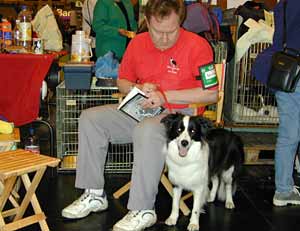
Deborah at the benches at Crufts
In any breed classes at Exemption and Open shows the judge selects their first, second, third, fourth (called Reserve) and fifth (called VHC or Very Highly Commended) choices in order of preference and places them, the rest of the class are then dismissed. Once all the classes have been judged all the unbeaten dogs are called back into the ring, these are not necessarily all the class winners because a dog may be entered in more than one class, so the winner of, for example Post Graduate may also have been entered, and subsequently been beaten in, the Open class. The unbeaten dogs are then judged against each other and the Overall winner declared Best of Breed, the judges second preference from the unbeaten dogs is then declared Reserve Best of Breed.
At Championship Shows the dogs and bitches are judged separately, the dogs are judged first and on conclusion of the judging of all the dog classes the unbeaten dogs are judged and the overall winner is awarded the Challenge Certificate (CC), the judges second overall choice is awarded the Reserve Challenge Certificate (RCC). Similarly on the conclusion of the bitch judging the bitch CC and RCC are awarded to the bitches placed first and second overall. The Challenge Certificate confirms that, in the judges opinion, the overall winner and the runner up are worthy of the title of Champion.
For a dog or bitch to gain the title of Champion they must win three CCs under three different judges with at lease one CC being won when the dog or bitch is over 1 year of age. In some breeds a dog cannot become a full Champion without also gaining working awards, this is the case with both border collies and golden retreivers. Dogs who have gained Champion status in the show ring but have not achieved working awards become Show Champions denoted by the suffix Sh. Ch. dogs with working awards become full Champions denoted by the suffix Ch.
The judge then the awards of Best of Breed (BoB), the dog CC winner and bitch CC winner are judged against each other and the judge's prefered choice is awarded Best of Breed - no further award towards a title is made for BoB.
The award for Best Puppy (BP) is the last award to be made, if both Minor Puppy and Puppy classes for dogs and bitches have been scheduled the Minor Puppy dog and Puppy dog are judged against each other, then the Minor Puppy bitch and Puppy bitch are judged against each other. The judges prefered puppy dog and puppy bitch finally compete against each other for Best Puppy in Breed (BP)
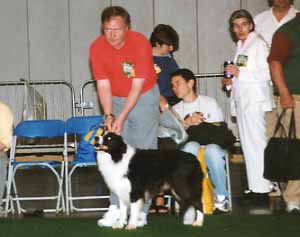
Scrumpy showing at Crufts
Most Open Shows and all Championship Shows are judged on the "Group System". When breed judging has been concluded the BoB goes forward to compete for "The Group" .
There are six groups.
-
Pastoral (collies, shepherds, cattle dogs, sheepdogs, and other herding and driving breeds)
- Gundogs (retreivers, setters, pointers, spaniels and other breeds used in field sports)
- Working (guarding, draught, rescue and freight breeds)
- Terriers (baiting, ratting and vermin control breeds)
- Toy (lapdogs and small companion dogs)
- Utility (all those breeds that do not easily fit into any other group)
All BoB winners in a group compete against each other (usually under a different judge) and the Group Judge choses four dogs who are placed in order of the judge's preference, no differentiation is made at this level beween dogs and bitches. The placings are referred to as Group 1 (first) Group 2 (second) etc. this is abbreviated to G1, G2, G3 and G4, the rest of the group are dismissed.
The final stage of judging takes place when the six Group winners meet (usually under a different judge) and compete against each other for Best in Show (BIS).
No further award towards a title is made for Group or BIS wins
Exemption Shows cannot be judged on the Group System because the classes are not separated by group, so after the Breed Classes have been completed, the four (or fewer) class winners compete directly for BIS).
Some Open Shows are not judged on the Group System and at these the BoB winners regardless of Group compete directly against each other for BIS.
Most Open Shows and Breed Championship Shows as well as some General Championship Shows schedule Puppy Group and Best Puppy in Show awards (BPIS) these are judged after the BIS has been awarded.
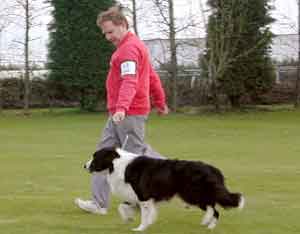
Hercules gaiting to show off his movement
If you want to compete;
-
Your dog will need to be registered with The Kennel Club on the Breed Register.
- Your dog will need to be at least 6 month old
- You will need to train your dog to stand still whist a stranger (the judge) examines - "goes over" him,
- You will need to teach your dog to gait (move at a steady trot) so that his movement can be assessed.
- When your dog is ready you will need to find out which shows are taking place, when and where,
- For Exemption Shows you can enter on the day
- For Open or Championship Shows you will need to plan some weeks in advace
- You will need to contact the Show Secretary and request a schedule for the show
- You will need to select your classes and enter your and your dogs details on the Schedule
- You will need to return the schedule to the Show Secretary by the published closing date
- You will need to trim or tidy up your dog as appropriate for the breed
- You will need to bath your dog (if appropriate to the breed)
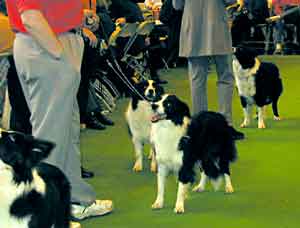
Cider at Crufts
Common sense tips for Dog Showing
- If you want to show your dog, arrange to take your dog or bitch back to see their breeder and ask her for an honest opinion of their show potential before you invest time and money entering shows.
- Spend some time at shows watching how things are organised and how experienced exhibitors behave.
- Don't be afraid to ask for help and advice, the advantage of being a novice is that you can ask for help without feeling foolish - remember every one there had to begin by learning.
- Do prepare your dog in advance golden retrievers will need trimming if they are not to look out of place and even border collies need their feet tidied up, the show is not the place to start preparing your dog.
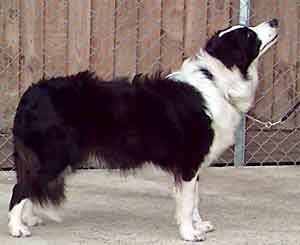
Practice at home before entering your dog in shows
